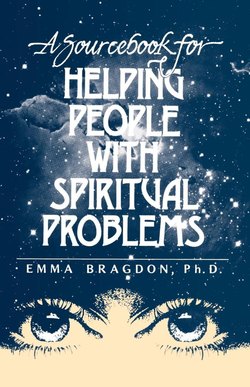A Sourcebook for Helping People With Spiritual Problems

Реклама. ООО «ЛитРес», ИНН: 7719571260.
Оглавление
Emma Inc. Bragdon. A Sourcebook for Helping People With Spiritual Problems
Introduction: David Lukoff, Ph.D
Preface
Chapter One. Spiritual Experience, Spiritual Problems and Spiritual Emergency
Spiritual Experiences and Psychological Well-Being
The Difference Between Spiritual and Religious Problems
Spiritual Emergence
Spiritual Emergency
Conceptual Frameworks and Supportive Contexts
Patterns of Spiritual Experiencing
Summary
Chapter Two. When Do Spiritual Experiences Occur?
Openness to Change vs. Rigidity
Time of Life
Spiritual Practice
Physical Distress
Natural Disaster
Emotional Distress
Intense Sexual Experience
Substance Use/Abuse
Summary
Chapter Three. Diagnosis
Psychosis and the DSM-IIIR
Criteria for Spiritual Emergence
Criteria for Spiritual Problems
COEX Systems
Multi-axial Evaluation
Summary
Chapter Four. Initial Interaction: Client and Helper
1. Medical/Psychiatric Evaluation
2. Minimal Use of Psychiatric Drugs
3. Quiet and Safe Environment
4. Compassionate and Knowledgeable Companion
5. Diagnosis
6. Educating about Spiritual Emergence Process
7. Help with Grounding, Centering, and/or Catharsis
8. Referral
Case Study
Chapter Five. Ongoing Support
Providing a Safe Environment
Facilitating Grounding
Getting Unstuck
Supporting Spiritual Emergence
Community Resources
Summary
Chapter Six. The Role of The Helper
Competencies of a Helper
References for Helpers
Chapter Seven. A Case Study
Chapter Eight. Global Trends Catalyzing Spiritual Emergence
Increased Tempo of Change
Cross-Fertilization of Religious Practices
Cross-Fertilization of Medical Practices
Increased Self-Awareness Through the Use of Drugs
Fanaticism
Summary
Appendix A. Identifying Community Resources for Helping People in Spiritual Emergency
Your Community's Resources
Appendix B. Evaluating Your Knowledge of Spiritual Problems
Appendix C. Articles of Interest
Forms of Spiritual Emergency
Soteria: An Alternative to Hospitalization For Schizophrenics
Soteria Final Progress Report Summary
Schizophrenics for Whom Phenothiazines are Contraindicated or Unnecessary
Mysticism Goes Mainstream
Toward a More Culturally Sensitive DSM-IV
Appendix D. Referrals
SEN and the Conferences of 1985
References to Referral Networks
24-Hour Care Centers
Literature on the Phenomenology of Spiritual Problems
Movies, CDs, and Audiotapes
Appendix E. Glossary
Bibliography
Отрывок из книги
Just as the ink is drying from the newly issued fourth edition of the Diagnostic and Statistical Manual (DSM-IV), which for the first time contains the category of spiritual problems, here appears the first-ever book devoted exclusively to the diagnosis and treatment of spiritual problems. Religious problems, which make up the other half of the official DSM-IV diagnostic category, "Religious or Spiritual Problem," have received much more attention in the clinical and research literature. There's a handbook (Wicks, Parsons, and Capps, 1985) and four journals devoted to pastoral counseling, several more to "Christian psychiatry," as well as professional organizations and conferences that address religious problems. Unfortunately, there is nothing comparable for spiritual problems. The Journal of Transpersonal Psychology has published several articles on spiritual problems (Lukoff, 1985; Ossoff, 1993; Waldman, 1992), but there is no journal devoted to this topic. This is surprising since surveys have shown that mental health professionals routinely see clients with spiritual problems. In one survey, psychologists reported that 4.5% of their clients brought a mystical experience into therapy within the past year (Allman et aI., 1992). Thus mental health professionals often work with spiritual problems, but many do not have appropriate training. Scott Peck, a psychiatrist who has written several books on the spiritual dimensions of life, including the best selling The Road Less Traveled, gave an invited address which drew a standing-room only crowd at the 1992 Annual Meeting of the American Psychiatric Association. He pronounced that psychiatrists are "ill-equipped" to deal with either religious /spiritual pathology or health. Continuing to neglect religious/spiritual issues, he claimed, would perpetuate the predicaments that are related to psychiatry's traditional neglect of these issues: "occasional, devastating misdiagnosis; not infrequent mistreatment; an increasingly poor reputation; inadequate research and theory; and a limitation of psychiatrists' own personal development" (Peck, 1993, p. 243).
Fortunately, in addition to the incorporation of spiritual problems as a diagnostic category in the DSM-IV, progress is occurring on other fronts. Francis Lu, M.D., has been working with the American Psychiatry Association and the Residency Review Committee to develop new guidelines for the Essentials for Psychiatry Residency Training, which sets forth the criteria used in the accreditation of all residency programs in the U.S .. These proposed criteria would be used to assess whether psychiatry residency programs are providing training in current American cultures and subcultures, especially related to gender, ethnicity, sexual orientation, and religious/spiritual beliefs. The adoption of these criteria would mandate that training programs for psychiatrists explicitly address religious and spiritual problems. In psychology, others such as Vaughan (1991), Krippner and Welch (1992) and Shafranske and Maloney (1990) have been bringing spiritual issues to the attention of clinical psychologists. Reviews of the research on psychoreligious and psychospiritual dimensions of healing (Lukoff, Turner, & Lu, 1992; 1993) indicate that recognition of these factors has been increasing in all of the allied mental health professions including rehabilitation, addiction counseling, nursing, and social work.
.....
(spirit) ...is constantly striving for release from its entrapment in routine or conventional mental structures ...if this work of releasing spirit becomes imperative but is not undertaken voluntarily with knowledge of the goal and with considerable effort, then the psyche is apt to take over and overwhelm the conscious personality with its own powerful processes.
(J. Perry, 1986)
.....